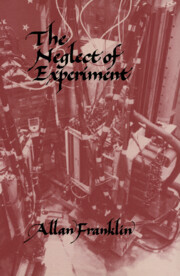Crossref Citations
This Book has been
cited by the following publications. This list is generated based on data provided by Crossref.
Franklin, Allan
1986.
Experiment and the Development of the Theory of Weak Interactions: Fermi's Theory.
PSA: Proceedings of the Biennial Meeting of the Philosophy of Science Association,
Vol. 1986,
Issue. 2,
p.
163.
Sargent, Rose-Mary
1988.
Explaining the Success of Science.
PSA: Proceedings of the Biennial Meeting of the Philosophy of Science Association,
Vol. 1988,
Issue. 1,
p.
55.
Brown, Harold I.
1988.
Normative epistemology and naturalized epistemology∗.
Inquiry,
Vol. 31,
Issue. 1,
p.
53.
Franklin, Allan
1988.
Theory and Experiment.
p.
141.
Nickles, Thomas
1988.
Theory and Experiment.
p.
33.
Ackermann, Robert
1988.
Experiment as the motor of scientific progress.
Social Epistemology,
Vol. 2,
Issue. 4,
p.
327.
Hacking, Ian
1988.
Philosophers of Experiment.
PSA: Proceedings of the Biennial Meeting of the Philosophy of Science Association,
Vol. 1988,
Issue. 2,
p.
147.
McCauley, Robert N.
1989.
Acceptability, analogy, and the acceptability of analogies.
Behavioral and Brain Sciences,
Vol. 12,
Issue. 3,
p.
482.
Wetherick, N. E.
1989.
Psychology, or sociology of science?.
Behavioral and Brain Sciences,
Vol. 12,
Issue. 3,
p.
489.
Papineau, David
1989.
Probability and normativity.
Behavioral and Brain Sciences,
Vol. 12,
Issue. 3,
p.
484.
Giere, Ronald N.
1989.
What does explanatory coherence explain?.
Behavioral and Brain Sciences,
Vol. 12,
Issue. 3,
p.
475.
Woodward, Jim
1989.
Data and phenomena.
Synthese,
Vol. 79,
Issue. 3,
p.
393.
Cheng, P. C.-H.
and
Keane, M.
1989.
Explanatory coherence as a psychological theory.
Behavioral and Brain Sciences,
Vol. 12,
Issue. 3,
p.
469.
O'Rorke, Paul
1989.
Coherence and abduction.
Behavioral and Brain Sciences,
Vol. 12,
Issue. 3,
p.
484.
Cohen, L. Jonathan
1989.
Two problems for the explanatory coherence theory of acceptability.
Behavioral and Brain Sciences,
Vol. 12,
Issue. 3,
p.
471.
Achinstein, Peter
1989.
Explanation and acceptability.
Behavioral and Brain Sciences,
Vol. 12,
Issue. 3,
p.
467.
Levine, Daniel S.
1989.
Explanatory coherence in neural networks?.
Behavioral and Brain Sciences,
Vol. 12,
Issue. 3,
p.
479.
Chi, Michelene T. H.
1989.
Assimilating evidence: The key to revision?.
Behavioral and Brain Sciences,
Vol. 12,
Issue. 3,
p.
470.
Read, Stephen J.
and
Miller, Lynn C.
1989.
Explanatory coherence in understanding persons, interactions, and relationships.
Behavioral and Brain Sciences,
Vol. 12,
Issue. 3,
p.
485.
Simon, Herbert A.
1989.
ECHO and STAHL: On the theory of combustion.
Behavioral and Brain Sciences,
Vol. 12,
Issue. 3,
p.
487.





